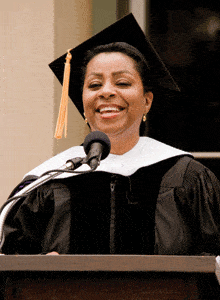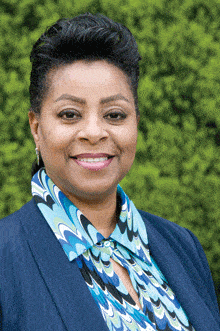A Conversation with Argelia Rodriguez

Trinity: In your inspiring Commencement address to the 2010 graduates, you told them to “find your inspiration and have the courage to pursue your passion and to be of value by being of service.” Do you remember what you aspired to be when you came to the U.S. from Cuba?
Rodriguez: I was very young when I came from Cuba. At the time, all I aspired to was a pink bedroom filled with lots of toys. It was only as I grew older that I began to understand why my parents had sacrificed so much and struggled to bring my brother and me to America. And like every other immigrant family, we aspired to the American Dream – a life full of opportunities, success and the freedom to be whatever you wanted to be.
Trinity: How did your industrial engineering education at Stanford University help you throughout your career?
Rodriguez: My engineering education from Stanford, as well as my business training at Harvard, helped me through my entire career. It has helped me in every job I have had to approach problems and problem-solving in a very systematic, detailed and strategic manner. DC-CAP is a great example.
The challenge was how do you go about dramatically increasing the number of D.C. students who enroll and graduate from college. I knew I had to approach the task as an engineering and a business problem.
It was a raw materials problem. How do you take a child who has low self-esteem from a dysfunctional school system who is academically, economically and socially disadvantaged and turn this child into a college graduate?
It was a production problem. How do you scale up an operation to serve a disparate population of students, through uneven facilities, with finite resources, while maintaining the quality of service and producing a targeted number of college graduates?
It was a financial problem. How do we sustain operations, plan for growth, make long-term commitments of scholarship funds, and serve an entire city as a completely privately-funded, nonprofit organization, operating in a federal enclave and fluctuating economy?
It was a marketing problem. How do you convince poor, under-educated parents to put aside money for their child’s education, to do without a principal wage earner for the next four or five years, to give up overtime pay so they can attend a financial aid seminar, or to value higher education when they have never had it? How do you do that when you know they may not be able to pay the light bill at the end of the month?
I had to draw on everything I learned at Stanford and Harvard to create an organization that met the challenges we were facing.
Trinity: What is your secret for balancing your career with your personal life?
Rodriguez: My family and my friends. They help me remember that there is much more to life than just work. Spending time with the people I care about is the priority which helps me keep everything else in perspective.
Trinity: What are the largest obstacles to getting every D.C. public and public charter high school student to college? Affordability? Preparedness? Parental support? Performance on standardized tests?
Rodriguez: All of the above! Affordability, academic and social preparedness, parental support and low standardized test scores are major obstacles to D.C. student college enrollment and success. But if I had to name the single most important obstacle to college enrollment, it is the lack of motivation and determination. A highly-motivated and determined student will work hard to overcome his or her academic deficiencies and low tests scores. A highly-motivated and determined student will find a way to pay for college even if he or she can’t rely on parental support. At DC-CAP, we work hard to help students and their parents understand the importance of a college education, overcome their fears and instill the motivation and determination necessary to ensure that nothing stands in the way of their college education.
Trinity: When DC-CAP was established in 1999, less than one-third of D.C. high school graduates enrolled in college – less than half the national average. Why was the District of Columbia lagging so far behind the rest of the country?
 Rodriguez: The District of Columbia, like many other cities and urban areas around the country, struggle with the issues of poverty, unemployment, insufficient college counseling resources and under-performing school systems, all of which contribute to low college enrollment rates. But what people fail to remember is that D.C. students faced an enormous challenge that no other students in the country had. Unlike students in every other state in the country – from Maryland, Virginia, California, New York or Texas – who have a choice of 30 to 40 public institutions of higher education, D.C. students’ only “in-state” option for a college education was the University of the District of Columbia. The lack of choices for students significantly impacted D.C. students’ college enrollment.
Rodriguez: The District of Columbia, like many other cities and urban areas around the country, struggle with the issues of poverty, unemployment, insufficient college counseling resources and under-performing school systems, all of which contribute to low college enrollment rates. But what people fail to remember is that D.C. students faced an enormous challenge that no other students in the country had. Unlike students in every other state in the country – from Maryland, Virginia, California, New York or Texas – who have a choice of 30 to 40 public institutions of higher education, D.C. students’ only “in-state” option for a college education was the University of the District of Columbia. The lack of choices for students significantly impacted D.C. students’ college enrollment.
In order to level the playing field for D.C. students, DC-CAP worked closely with local government and Congress to gain approval for the D.C. College Access Act. The act established the D.C. Tuition Assistance Grant (DC-TAG) program which provides subsidies to D.C. students to attend any public university in the county at “in-state” tuition rates, as well as a subsidy for students attending a historically black college or university, and local private institutions like Trinity. DC-CAP also established college information resource centers in each D.C. public and charter high school staffed with full-time advisors who are dedicated to providing D.C. students and their parents with the college counseling and the resources necessary to enroll and graduate from college.
Trinity: Has the above statistic improved today?
Rodriguez: We are pleased to announce that because of the collaboration with the DCPS and charter high schools faculty, and our partnerships with parents, city officials and Congress, now 60 percent of all D.C. public and charter high school graduates go on to enroll in college. And more importantly, over 40 percent of them go on to earn their college degrees within five years.
Trinity: How do you see your role as a Trinity trustee?
Rodriguez: As a Trinity trustee, I see my role as an advisor to our wonderful President Pat McGuire and her leadership team on issues of academic, financial and operating policy, as well as a guardian of the tradition of integrity and academic excellence that has made Trinity the outstanding institution that it is today. And as the president and CEO of DC-CAP, I also feel I have a special obligation to ensure that Trinity continues to provide the extraordinary support and programming that promotes the success of the D.C. students which it serves.
Trinity: How do Trinity students benefit from the partnership with DC-CAP?
Rodriguez: DC-CAP starts to prepare the students as early as ninth grade, to aspire to, to enroll and succeed in earning their degree from Trinity. DC-CAP encourages the young women to take advantage of every educational opportunity that the institution provides, to value the quality education they will receive from Trinity and to commit to being the best they can be.
Trinity: Where does DC-CAP get its funding from?
Rodriguez: DC-CAP is a completely privately-funded nonprofit organization. We are supported by generous corporations, foundations and individuals from the D.C. region and around the country who have made a long-term commitment to increasing the number of D.C. students who are able to enroll and graduate from college. Funders include Verizon, Lockheed Martin, The Washington Post, the Gates, Carnegie and Walton Foundations, Fannie Mae, Sallie Mae, Marriott, ExxonMobil, Bank of America and many others whose support is critical to the success of DC-CAP’s mission.
Trinity: Getting high school students into college is one amazing accomplishment. Helping them see it through to graduation is an even larger hurdle. How does DC-CAP achieve this?
Rodriguez: DC-CAP provides college students with ongoing individual services designed to ensure that students are academically and financially prepared to complete their college education. DC-CAP College Retention Services works to build and maintain a supportive relationship with students starting with their freshman year of high school through their college graduation. The relationship begins with exposing high school students to the college campus culture through activities, presentations, college tours and seminars. DC-CAP College Retention Services also assists college students in identifying and connecting with on-campus student support services and personnel. DC-CAP’s support services continue with monitoring and evaluating the academic progress of each college student by reviewing semester grades, recommending appropriate remedial action (if necessary) and working with college academic advisors to ensure the student remains in good academic standing. Financially, DC-CAP College Retention Services works to assist students and their families to secure scholarships, institutional aid, private, federal and local grants each year for college enrollment, and provides the “Last Dollar Award” scholarships for eligible students with unmet financial need.
Trinity: With all that DC-CAP is doing to help enable students to go on to college and successfully complete their degrees, is there a mindset that needs to be changed among students, parents, or the D.C. community?
Rodriguez: The students, parents and the entire D.C. community need to understand that getting a college education is the best way to ensure that an individual is prepared to build a career and the future he or she aspires to have. And that as residents of D.C., every student has the opportunity to realize his or her dream of a college education.
Trinity: Tell me about the Alpha Leadership Project.
Rodriguez: The Alpha Leadership Project (ALP) is a program which serves ninth grade minority males with the goal of encouraging them to stay engaged in the educational process, improve academic achievement and increase their possibility of enrolling in and graduating from college. The program features student workshops, parent training, mentoring, and educational extracurricular activities. Once the boys graduate from the ninth grade program, they are eligible to join the Alpha Leadership Fraternity (ALF). The ALF is a high school-based fraternity that stresses positive peer pressure, standards of behaviors, academic achievement, service and leadership.
Trinity: What is your greatest hope for the DC-CAP program?
Rodriguez: My greatest hope for DC-CAP is that we continue to change lives by giving every student a chance at a college education. And that by providing that opportunity we help to break the cycle of poverty and under-education that has plagued generations of D.C. students and their families. The good news is that we now have multiple siblings enrolled in college from families where no one had ever been to college before.
Trinity: What parting thoughts do you have for Trinity’s 2010 graduates?
Rodriguez: I would ask them to remember what I said during my speech: to become lifelong learners, find what inspires them and have the courage to pursue their dreams, and to be of value by being of service. Those are the keys to a successful and fulfilled life!